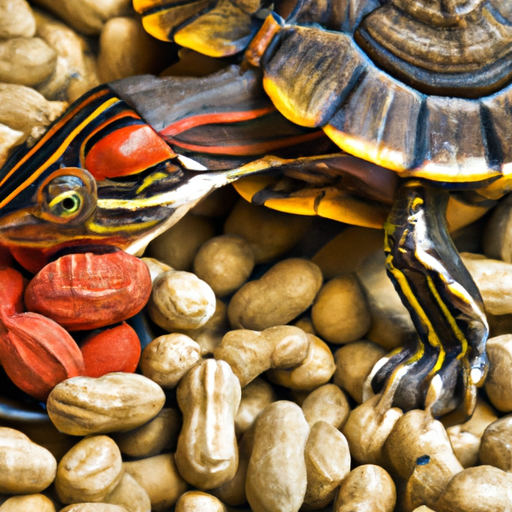
Let’s talk about an interesting topic today: Can turtles eat pineapple? Many pet turtle owners often wonder about this, as turtles have specific dietary needs.
Pineapple is a delicious and juicy tropical fruit, but is it safe for our shelled friends? In this article, we’ll explore whether turtles can enjoy pineapple as part of their diet and delve into the potential benefits or risks associated with this sweet fruit.
So, if you’ve ever wondered about feeding your turtle pineapple, stick around to find out all the juicy details!
Health Benefits of Pineapple for Turtles
Pineapple is not only a delicious tropical fruit, but it also offers a range of health benefits for turtles.
While turtles primarily thrive on a diet of leafy greens and protein, introducing a variety of fruits can help provide essential nutrients and vitamins.
Pineapple is one such fruit that can be a great addition to the diet of your pet turtle.
Nutritional Content of Pineapple
Pineapple is a nutrient-rich fruit, offering an array of vitamins, minerals, and antioxidants. It is low in calories and fat, making it an excellent snack for turtles.
The fruit is a rich source of Vitamin C, which acts as an immune booster and aids in wound healing. It also contains Vitamin A, which supports healthy vision and skin in turtles.
Vitamins and Minerals Found in Pineapple
In addition to Vitamin C and Vitamin A, pineapples contain several other vitamins and minerals that are beneficial for turtles.
These include B-vitamins, such as thiamin, riboflavin, and niacin, which assist in metabolizing food and maintaining proper energy levels in turtles.
Potassium, copper, and manganese are also present in pineapple and contribute to the overall health of turtles.
Fiber Content in Pineapple
Fiber plays a crucial role in maintaining a healthy digestive system for turtles. Pineapple contains a significant amount of dietary fiber, which aids in smooth bowel movements and prevents constipation.
Including pineapple in your turtle’s diet can help promote proper digestion and reduce the risk of digestive issues.
Risks and Considerations
While pineapple offers numerous health benefits for turtles, it is important to consider certain risks and precautions.
Potential Digestive Issues
Despite pineapple’s high fiber content, excessive consumption can lead to digestive issues in turtles. Pineapple contains an enzyme called bromelain, which can cause stomach upset and diarrhea if turtles consume it in large quantities. It is crucial to introduce pineapple gradually into your turtle’s diet and monitor their response.
High Sugar Content in Pineapple
Pineapple is naturally sweet and contains natural sugars. While small amounts of sugar are generally safe for turtles, it is essential to avoid overfeeding them with high-sugar fruits like pineapple. Excessive sugar intake can lead to weight gain and other health problems in turtles. As with any fruit, moderation is key.
Feeding Frequency and Portion Size
Maintaining a balanced diet is crucial for the overall well-being of turtles. Pineapple should be fed in moderation and as part of a varied diet. It is important to offer pineapple as a treat rather than a staple food item. Serving pineapple once or twice a week in small portions will ensure your turtle receives its nutritional benefits without any adverse effects.

Preparing Pineapple for Turtles
Before introducing pineapple to your turtle, it is essential to prepare it properly to ensure they can consume it easily and safely.
Selecting a Ripe Pineapple
Choose a ripe pineapple for your turtle to enjoy. Look for one that is golden in color, with a sweet aroma. Avoid pineapples that are too firm or have signs of mold or spoilage. A ripe pineapple will be juicy and bursting with flavor, making it an irresistible treat for your turtle.
Removing the Skin and Core
To make pineapple more accessible for turtles to eat, it is important to remove the tough outer skin and fibrous core. Slice off the top and bottom of the pineapple and use a sharp knife to cut away the skin, ensuring no prickly bits are left. Then, carefully cut out the central core as it can be tough and difficult to digest for turtles.
Slicing or Dicing for Easy Consumption
Turtles have different feeding preferences and abilities, so it is important to prepare pineapple in a way that makes it easy for them to eat. Slicing or dicing the pineapple into bite-sized pieces will ensure your turtle can consume it comfortably. Remember, the smaller the pieces, the easier it will be for them to chew and swallow.
How to Introduce Pineapple to Turtles
Introducing any new food to your turtle’s diet should be done gradually to observe their response and prevent digestive issues.
Gradual Transition to Pineapple
Start by offering small portions of pineapple as a treat alongside their regular diet. Begin with a few small pieces and gradually increase the amount over time. This gradual transition will allow your turtle’s digestive system to adjust to the new food and minimize the risk of any adverse reactions.
Observe for Allergic Reactions
While rare, turtles, like humans, can have allergic reactions to certain foods. When introducing pineapple or any new fruit to your turtle’s diet, keep a close eye for any signs of allergic reactions such as swelling, hives, or difficulty breathing. If any such symptoms appear, discontinue feeding pineapple and consult with a veterinarian.

Alternative Fruits for Turtles
While pineapple can be a tasty and nutritious addition to your turtle’s diet, there are also a variety of other safe and nutritious fruits to consider.
Safe and Nutritious Fruit Options for Turtles
Some other fruits that are safe for turtles to consume include strawberries, blueberries, raspberries, apples, and bananas. These fruits offer a range of vitamins and minerals, and when offered in moderation, they can provide a balanced and varied diet for your turtle. Always remember to research and introduce new fruits gradually, ensuring they are suitable for your specific turtle species.
Final Thoughts
Incorporating pineapple into your turtle’s diet can provide a range of health benefits, such as essential vitamins, minerals, and fiber.
However, it is important to consider the risks associated with excessive consumption and the potential digestive issues that can arise.
By following the guidelines provided in this article and consulting with a veterinarian if necessary, you can ensure that your turtle enjoys the benefits of pineapple in a safe and controlled manner.
Remember to maintain a balanced diet for your turtle by offering a variety of nutritious food options, including different fruits, vegetables, and protein sources, to keep them happy and healthy for years to come.



